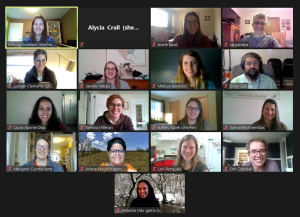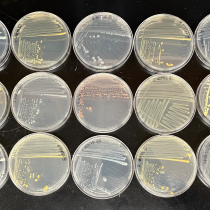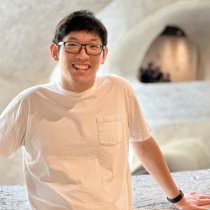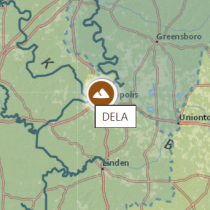Spotlight
Thriving Earth Exchange and NEON Launch New Community Science Partnership
February 12, 2021
AGU's Thriving Earth Exchange Program has welcomed the newest cohort of Community Science Fellows, and first in partnership with NEON! This cohort is comprised of field staff across 12 of NEON’s Domains. Beginning in February 2021, they will be conducting outreach to communities within their Domains, and ultimately working with them to launch collaborative, co-developed community science projects that produce on-the-ground impact through application of NEON’s data and resources.
Thriving Earth Exchange (TEX) is an international association of more than 60,000 advocates and experts in Earth and space science that fosters community science partnerships to advance local priorities. The NEON Fellows selected for this cohort received TEX Community Science training and will gain mentorship from AGU Thriving Earth Exchange staff, connectivity to a growing network of Community Science Fellows, and the opportunity to serve as leaders in community science in their Domain and across the Observatory.
Meet the Fellows!
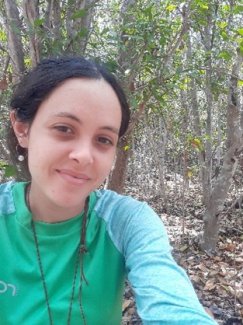
Laura Aponte Diaz
Laura Aponte Díaz
NEON Domain 4
Laura is a Field Technician working in the Flora Terrestrial Sampling team as part of the NEON project at the Atlantic Neotropical Domain of Puerto Rico. She has a B.S. in Biology from the University of Puerto Rico. Her botanical interest sparks constantly while collecting data on the flora protocols such as measuring vegetation structures and plant diversity. Botany is part of her ongoing personal research on the effects of the invasive Harrisia cactus mealybug on Puerto Rican native cacti survival and reproduction. During the past years, her involvement in community science and has been residing in a coastal community in Aguadilla, Puerto Rico to know about coastal erosion data. The experience has promoted in the community an environmental protection effort of the area and awareness of proper coastal planification. “I believe there is more to achieve with science in the hands of the community. It can strength our confidence and commitment with one another to resolve problems.”
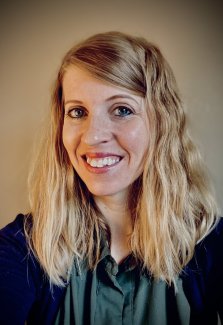
Melissa Benedict
Melissa Benedict
NEON Domain 3
Melissa Benedict is the Lead Fauna Field Ecologist and Outreach Liaison for Domain 03 of the National Ecological Observatory Network (NEON) based in Gainesville, FL. Melissa collects and coordinates all fauna related data for 3 sites that comprise NEON’s Southeastern Coastal Plain Domain as part of NEON’s mission to collect long-term open access ecological data to better understand how U.S. ecosystems are changing. She also coordinates all outreach activities for NEON’s Domain 03. Melissa earned a Bachelor’s degree in Zoology from Southern Illinois University where the beauty and biodiversity of the region allowed her love of the outdoors and science to blossom. After spending several years as a zookeeper, Melissa went back to work towards a Master’s degree in Biology with a specialization in Aquatic Science. Melissa joined the NEON program in 2017, and quickly found a home among the beetles, soil, and small mammals she works with. When not at work, Melissa is usually out enjoying the natural beauty of Florida with her partner and 2 children. Melissa is looking forward to working as a TEX Fellow with the people of Florida to execute positive environmental change.
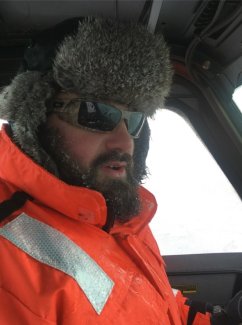
Gregory Cain
Gregory Cain
NEON Domain 14
Greg Cain is a Technician Specialist working for Battelle on the NEON Program. He operates and troubleshoots automated instrument systems that collect environmental data. He spends much of his time training new instrumentation technicians and is dedicated to helping maintain many of the safety programs operating under the NEON Program. He holds a Masters of Science in Biology and Bachelor of Science in Fisheries and Wildlife Biology from the University of North Dakota. He spends his free time wood working, tinkering with small electronics projects, and walking his two dogs.
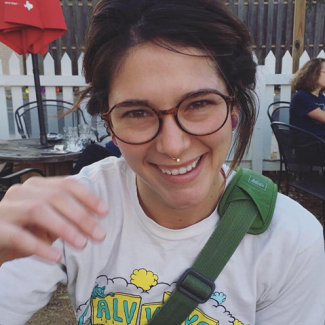
Loagan Clements
Loagan Clements
NEON Domain 11
Loagan Clements (she/her) is an Aquatic Field Ecologist with the National Ecological Observatory Network and is entering her third year with the Observatory. An indiscriminate nature lover, she has worked with mammals, birds, fishes, soil, grass, trees, and bugs. She transitioned into ecology after teaching middle school mathematics for two years, looking for a more physical job and time outdoors. Before finishing her first degree she participated in a service learning course in rural Shaxi, China studying the impacts of Globalization on Multiculturalism, during which time she developed a curiosity about how global development can continue through culturally and environmentally productive means. When not wading in the streams of North Central Texas she can be found hiking and kayaking with her dog, Louie, running, practicing yoga, reading, or getting creative with knitting needles, graphite, and plant-based cooking.
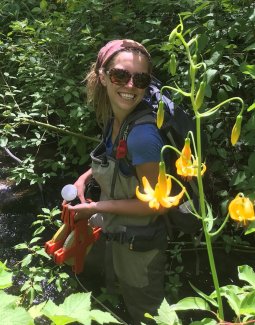
Erin Crandall
Erin Crandall
NEON Domain 17
Erin Crandall (she/her) is an Aquatic Field Ecologist with the National Ecological Observatory Network program in the Pacific Southwest domain, located in Fresno, CA. In her career as an Aquatic scientist, her focus has been on ecological response to environmental changes including climate, land-use and contamination. She holds a B.S. from the University of California San Diego in Environmental Science, and is a M.S. candidate at the University of Maryland Center for Environmental Science. Having grown up in the Central Valley, she is excited to be in a position now through NEON and through AGU’s Thriving Earth Exchange program to go beyond observing and describing environmental issues, and engage with leaders and members of her local community and empower them to use science to advance goals within the community.”
Margaret Cumberland
Margaret Cumberland
NEON Domain 7
Margaret Cumberland is the Flora Field Ecologist at the Appalachians and Cumberland Plateau Domain (D07), part of Battelle’s National Ecological Observatory Network (NEON) Program. She is based out of East Tennessee and has been with NEON for 6 years. Her role involves leading a team of technicians to collect ecological data, and in particular ensures the accuracy and integrity of the flora-related data products. In addition, she is a NEON Certified Trainer, acts as the Domain’s the Safety and Security Officer, is the office’s IT liaison, and assists with outreach events. She has an M.S. in Conservation Ecology and Sustainable Development from the University of Georgia, and B.S.’s in Biological Sciences, Botany, and Zoology from NC State University. Outside of NEON, Margaret enjoys participating in environmental education and citizen science programs (particularly ones involving plants or birds), as well as camping in the local parks or doing various DIY projects.
Janelle Hakala
Janelle Hakala
NEON Domain 10/13
Janelle Hakala lives in Boulder, CO and is an Instrumentation Field Ecologist for the National Ecological Observatory Network (NEON). She maintains four Eddy Covariance Flux Towers across the Southern Rockies and the Central Plains as part of NEON’s Terrestrial Instrument System. The automated instrumentation Janelle services collects meteorological and soil data to study ecosystem-level change over time. Prior to NEON, Janelle worked as a meteorologist in Antarctica and on a weather modification project in North Dakota. Her role in Antarctica involved launching weather balloons and taking observations for flight support across the continent. During Janelle’s time on the North Dakota Cloud Modification Project, she directed aircraft across western North Dakota for seeding operations based on weather radar. She received her B.S. in Atmospheric Science from the University of North Dakota in 2017. Outside of work, she enjoys being outdoors especially skiing and hiking.
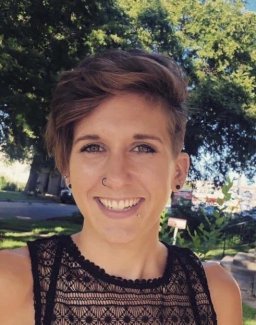
Tamara Hillman
Tamara Hillman
EON Domain 6
Tamara Hillman, Senior Field Ecologist at NEON Domain 06. I am passionate about monitoring wildlife populations, and I love doing anything outdoors. I find joy in training the next generation of field ecologists, introducing them to a career path in the sciences, and inspiring them to take their next steps. It has been exciting working on the NEON project in its early years, and I am proud of the contributions I have made to optimize our sampling protocols. I strive for continued improvement in everything we do, and to produce high quality ecological data that will bring big science to the forefront of climate research. When I’m not running trap lines or getting scope eyes, I enjoy walking my rescue dog Winston, reading, and changing people’s perspectives of “scary” insects through the beauty of art.
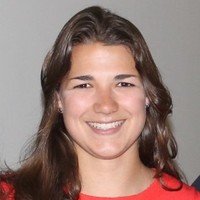
Samantha Kremidas
Samantha Kremidas
NEON Domain 10/13
Samantha Kremidas lives in Boulder, Colorado and works as a Technician Specialist for the National Ecological Observatory Network (NEON), a project funded by the National Science Foundation and managed by Battelle. She has been thrilled that the NEON project allows her to contribute to a large-scale, long–term ecological data set that is free for public use and is excited for the possibilities the project promises. She is primarily responsible for training and managing seasonal staff to collect small mammal, insect, and soil data through field sampling and ensuring data quality. Samantha received her B.S. in Natural Resource Management with a concentration in wildlife management from the University of Connecticut. Through her career at NEON, Samantha found a passion for leading teams, prompting her pursuit of a M.S. in Management through Wilmington University. Outside of work, Samantha enjoys experiencing nature in her free time through backpacking, skiing, and fishing.
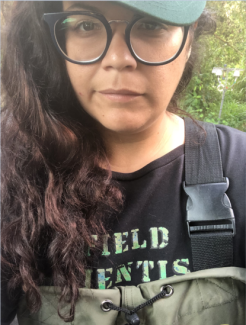
Arlene Megill-Irizarry
Arlene Megill-Irizarry
NEON Domain 4
Arlene M. Megill-Irizarry is a Fauna Field Ecologist at the National Ecological Observatory Network with 5 years of experience in Fauna and Flora. She received a B.S. in Biology with a minor on Entomology from the University of Puerto Rico Mayaguez Campus and is currently pursuing an M.S. in Environmental Science at the Pontifical Catholic University of Puerto Rico. Her research interest is in Ground Beetles Ecology and Environmental Planning. Arlene is very excited to join this year’s Fellowship Cohort.
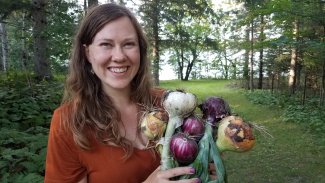
Lori Petrauski
Lori Petrauski
NEON Domain 18/19
Lori Petrauski is a dedicated naturalist currently working as a field ecologist for the Alaska domain of the National Ecological Observatory Network. She hold a M.S. degree in Wildlife and Fisheries from West Virginia University and a B.S. degree in Ecology from Seattle Pacific University. Her professional interests include long-term ecological monitoring, natural history, and boreal and arctic ecosystems. As part of her Master’s research, Lori launched a climate history project in the state of West Virginia to gather ecological observations from citizens over the past century to use in climate change analyses. In her free time she enjoys exploring the trails of interior Alaska and reading.
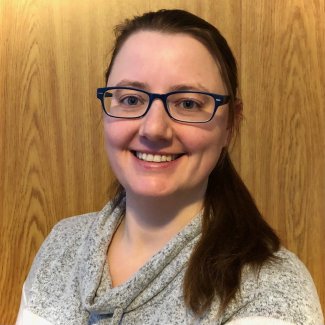
Ashley Spink
Ashley Spink
NEON Domain 5
Ashley Spink works as a Senior Field Ecologist for the National Ecological Observatory Network (NEON), operated by Battelle. She works in Northern Wisconsin and the Upper Peninsula of Michigan leading crews conducting field measurements and collecting samples on forest rodents, ground beetles, ticks, mosquitos, and soil. Ashley’s background is in wildlife ecology with a master’s degree from the University of WI-Green Bay in Environmental Science & Policy and a bachelor’s degree from the University of WI-Stevens Point in Wildlife Ecology & Management. In her free time, she loves spending time with her husband and two children, hiking or snowshoeing in the forest, and riding her horses. Ashley is passionate about science communication at the community level and making science accessible to everyone.
